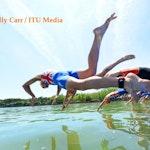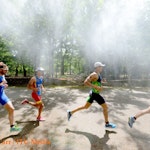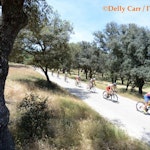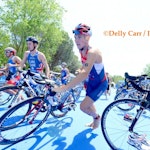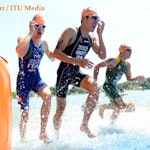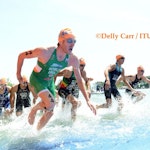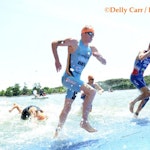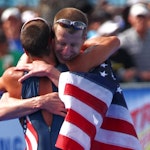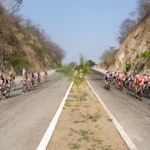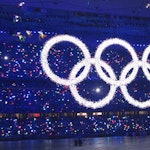Final Olympic qualification update before 2012 ITU World Triathlon Madrid
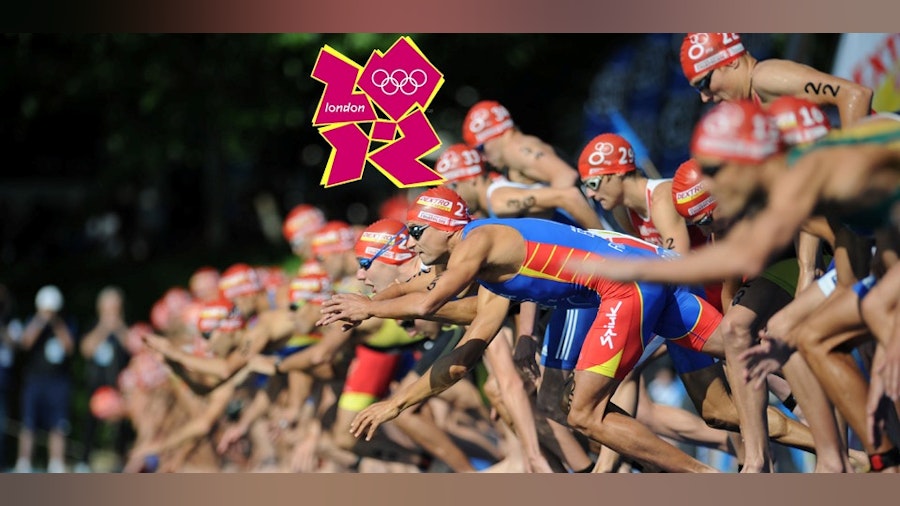
The race for a spot on the London 2012 Olympic Games triathlon start list began in Madrid almost exactly two years ago. So it’s a perfect symmetry that the Spanish capital is also where it will end this weekend. Over the past two years athletes have not just been racing for podium places in the ITU World Triathlon Series, but also for a spot on the Hyde Park pontoon. But what does it actually mean for this weekend’s race? We break out the current Olympic simulation and calculators and tell you here.
Elite Women’s Simulation
Currently the eight National Olympic Committees who can send a maximum of three athletes, in order, are: United States, Australia, Great Britain, Japan, France, Spain, New Zealand and Germany. That top six are secure, but coming into Madrid, New Zealand, Germany and the ninth-placed nation, Switzerland, are all in with a chance to send three women.
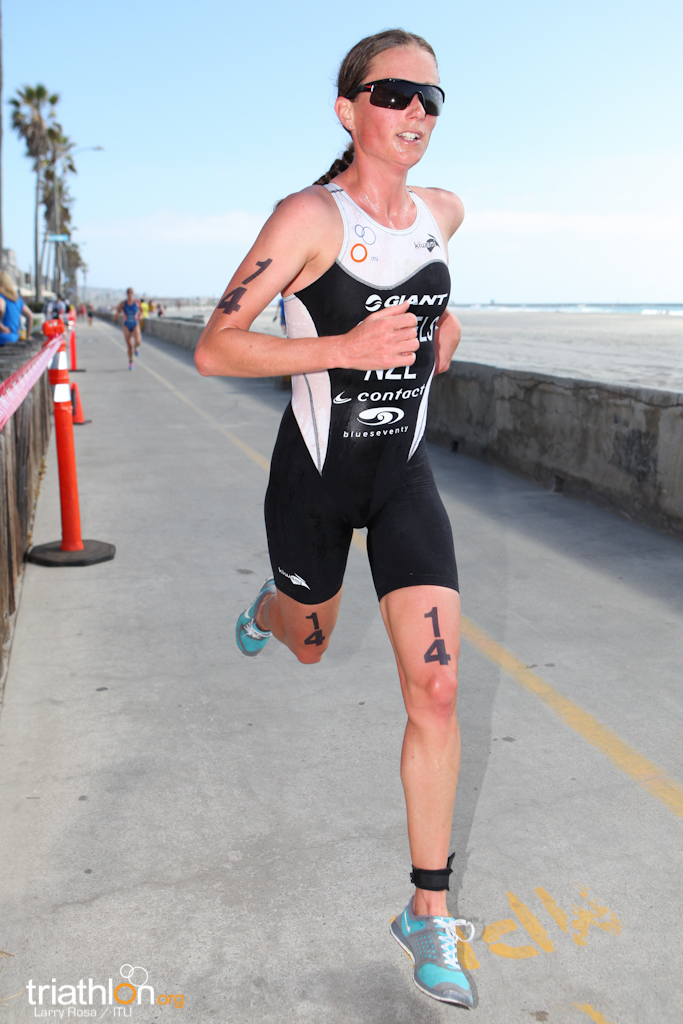 Currently Debbie Tanner is New Zealand’s third athlete, and she sits 76 points ahead of Germany’s third athlete Kathrin Muller. However Tanner isn’t racing this weekend, which means New Zealand’s fourth athlete Nicky Samuels needs to overtake Muller to stay in seventh, she’s 36 points behind, or Samuels could still potentially finish behind Muller but have New Zealand stay in eighth.
Currently Debbie Tanner is New Zealand’s third athlete, and she sits 76 points ahead of Germany’s third athlete Kathrin Muller. However Tanner isn’t racing this weekend, which means New Zealand’s fourth athlete Nicky Samuels needs to overtake Muller to stay in seventh, she’s 36 points behind, or Samuels could still potentially finish behind Muller but have New Zealand stay in eighth.
Except the wildcard in the mix here is Switzerland’s Daniela Ryf. Ryf is one of only ten women to have won a series title since the new multi-round World Championship format started, but she had a tough 2011 dealing with injury. While she started the season well with sixth place in Mooloolaba, Ryf pulled out of Sydney with illness and didn’t finish in San Diego.
But the difference in points that Ryf is from Muller and Samuels, 277 points and 241 points respectively, is certainly achievable. While it depends on where Samuels and Muller finish, a top eight finish could potentially see Ryf and Switzerland in the picture. Working in Switzerland and New Zealand’s favour is that both Samuels and Ryf are two of the strongest cyclists on the circuit, and could potentially be supported by the already pre-selected Olympians, Andrea Hewitt and Nicola Spirig. On the Madrid course that is conducive to breakaways, Germany will have to watch to see that doesn’t happen for them to stay in the race. Overall, it’s going to be a fascinating race to see which NOCs can field the maximum three athletes.
Elsewhere in the field the continental new flag places will be closely contested and watched. These places are for an athlete from an country that does not already hold a place in the overall Olympic rankings, and are judged from an overall ITU points list base, not the Olympic rankings.

It’s also set to be close in terms of who can move their NOC onto the overall Olympic simulation. At the moment, 55th place is filled by Vendula Frintova – which currently gives the Czech Republic two spots in London. But just behind her – by a mere 15 points - is Margit Vanek, who will be aiming to secure two spots for Hungary by putting herself back on the list. Behind Vanek is Luxembourg’s Elizabeth May, who has also been in the Olympics picture over the past six months, and while she’s currently 139 points behind Frintova, that’s not insurmountable. It’s also very close for the few women just above Frintova, in fact Maaike Caelers (NED), Mateja Simic (SLO), Frintova and Vanek are all within 40 points of each other, which means those final few Olympic places could be decided by a matter of seconds in the Saturday race in Madrid.
Click here for the current Women’s Olympic Simulation
Elite Men’s Simulation
The journey to see which NOCs can field the maximum among the men has been particularly complicated over the past few months. While Great Britain, Germany, Spain and France locked up their chance to send three athletes months ago, it left New Zealand, Russia, Australia, Canada and Portugal all on the edge. However, Russia’s third man Ivan Vasiliev rocketed up the rankings after a brilliant that included sixth in Sydney then a bronze medal at the European Championships. Last weekend in San Diego all three of New Zealand’s pre-selected Olympic team, Ryan Sissons, Bevan Docherty and Kris Gemmell, finished in the top-10 which secured their three places.

Right now, McMahon is 149 points ahead of Portugal’s Joao Pereira. Both have spent the last 12 months in a desperate chase for points across the globe, and with it have found form. McMahon claimed his first ITU World Cup win in Tiszaujvaros last year and a top ten finish in Yokohama. But Pereira, the 2009 U23 World Championship bronze medallist, has been on a steady points chase that has included highlights like fifth at the 2011 Ishigaki ITU World Cup, sixth at the 2011 European Championships and 16th in London last year. It’s a race that is too close to call, and once to watch with interest on Sunday.
Just as in the women’s new flag continental places, some of the men’s new flag spots will be decided. These places are for an athlete from a country that does not already hold a place in the overall Olympic rankings, and are judged from an overall ITU points list base.
 The closest race right now is the European New Flag spot, with Richard Varga moving Slovakia there after his fourth place in China last week. Just behind him is Denmark, courtesy of Jens Toft, and then Israel, courtesy of Dan Alterman. There is just 44 points separating the three, however Toft isn’t on the start list for Madrid. That means it’s likely to come down to either Slovakia or Israel. In the past two months, this European New Flag spot has been the one with the most change in the men’s simulation – and it’s emerging as one of the closest fought battles in the whole of the Olympic simulation. But the Africa new flag spot could also be up for grabs in Spain, as Zimbabwe’s Christopher Felgate is not racing, but the man behind him in the Olympic simulation, Morocco’s Mehdi Essadiq, is. Trailing by 184 points, Essadiq can determine his own Olympic fate with the right performance.
The closest race right now is the European New Flag spot, with Richard Varga moving Slovakia there after his fourth place in China last week. Just behind him is Denmark, courtesy of Jens Toft, and then Israel, courtesy of Dan Alterman. There is just 44 points separating the three, however Toft isn’t on the start list for Madrid. That means it’s likely to come down to either Slovakia or Israel. In the past two months, this European New Flag spot has been the one with the most change in the men’s simulation – and it’s emerging as one of the closest fought battles in the whole of the Olympic simulation. But the Africa new flag spot could also be up for grabs in Spain, as Zimbabwe’s Christopher Felgate is not racing, but the man behind him in the Olympic simulation, Morocco’s Mehdi Essadiq, is. Trailing by 184 points, Essadiq can determine his own Olympic fate with the right performance.
In the overall Olympic simulation, Peter Croes’ result in the Jiayuguan Premium Asian Cup in China helped to add a few points to his total ahead of Argentina’s Gonzalo Raul Tellechea and keep himself on the Olympic simulation, in 55th place, and Belgium in with a chance to send two men to London. However, if Tellechea can work his way back onto the overall list – it could change things in the Americas new flag spot. Tellechea currently holds that, but if he earns himself a spot by the Olympic qualification list, that new flag place will be re-allocated to the next in line, which at this stage would mean Colombia’s Carlos Javier Quinchara Forero. Tellechea is currently just 48 points behind Croes, or about the difference from 15th to 18th place in Madrid. Also adding to the mix is that the man just behind them, South Africa’s Erhard Wolfaardt is within 125 points of the last spot – and he’s racing in Madrid as well.
Click here for the current Men’s Olympic Simulation
The ITU’s qualification system is based on athletes securing places for their respective National Olympic Committee (NOC). Once countries have their Olympic spots, it is up to each National Federation to determine which athletes will be selected to represent their country at the Olympic Games. This weekend is the final chance to change the allocation of Olympic spots as per the points list, however this might not be the final list NOCs who will be on the start list in London as individual NOCs and NFs ultimately determine who they send. Therefore, while the Olympic simulation is good guide to which NOCs and athletes will fill the respective 55 men’s and women’s places come August in Hyde Park, it is not the final field.
Article gallery
Related Event: 2012 ITU World Triathlon Madrid
| Results: Elite Women | |||
|---|---|---|---|
| DNF. | Yi Zhang | CHN | DNF |
| DNF. | Emma Jackson | AUS | DNF |
| DNF. | Margit Vanek | HUN | DNF |
| DNF. | Marina Damlaimcourt | ESP | DNF |
| DNF. | Abbie Thorrington | GBR | DNF |
| Results: Elite Men | |||
|---|---|---|---|
| DNF. | Tim Don | GBR | DNF |
| DNF. | Fabio Carvalho | BRA | DNF |
| DNF. | Juraci Moreira | BRA | DNF |
| DNF. | Gavin Noble | IRL | DNF |
| DNF. | Erhard Wolfaardt | RSA | DNF |
| Results: Para Triathlon Male TRI-6 | |||
|---|---|---|---|
| 1. | Fernando Riaño B3 | ESP | 01:22:49 |
| Results: Para Triathlon Male TRI-5 | |||
|---|---|---|---|
| 1. | Martin Falch | AUT | 01:13:16 |
| 2. | Miguel Angel Ubeda Salmeron | ESP | 01:13:32 |
| 3. | Daniel Molina | ESP | 01:22:44 |
| 4. | Raul Zambrana Romero | ESP | 01:29:56 |
| DNF. | Mikel Garmendia | ESP | DNF |
| Results: Para Triathlon Male TRI-4 | |||
|---|---|---|---|
| 1. | Péter Boronkay | HUN | 01:07:23 |
| 2. | Jairo Ruiz Lopez | ESP | 01:09:17 |
| 3. | Antonio Franco Salas | ESP | 01:15:40 |
| DNF. | Jorge Orejon Miguel | ESP | DNF |
| DNF. | Ruben Sánchez Diaz | ESP | DNF |
| Results: Para Triathlon Male TRI-3 | |||
|---|---|---|---|
| 1. | Geoffrey Wersy | FRA | 01:20:55 |
| 2. | Santiago Solino Nebot | ESP | 01:26:40 |
| 3. | Raphaël Chaussin | FRA | 01:29:31 |
| 4. | Antonio Pacheco Salas | ESP | 01:34:10 |
| 5. | Valeriano Moreno Garcia | ESP | 01:36:21 |
| Results: Para Triathlon Male TRI-2 | |||
|---|---|---|---|
| 1. | Ricardo Marin Arcis | ESP | 01:23:07 |
| 2. | David Peiffer | FRA | 01:27:50 |
| Results: Para Triathlon Male TRI-1 | |||
|---|---|---|---|
| 1. | Francesc Sola Garcia | ESP | 01:16:23 |
| 2. | Norberto Chavez Oliva H1 | ESP | 01:39:53 |
| Results: Para Triathlon Female TRI-6 | |||
|---|---|---|---|
| 1. | Susana Rodriguez B1 | ESP | 01:16:25 |
| Results: Para Triathlon Female TRI-4 | |||
|---|---|---|---|
| 1. | Gwladys Lemoussu | FRA | 01:29:28 |
Related articles
-
London 2012 Olympic Qualifying Update after San Diego
It was the penultimate race in the London 2012 Olympic Games official Qualification period, and ITU San Diego saw some Olympic dreams realised and some dashed. Find out more here.02:21 - 16 May, 2012 -
London Olympic qualifying update after Huatulco, before San Diego
It was the final ITU World Cup of the Olympic Games Qualification period, and Huatulco did its part to shake up the Olympic simulation. Find out where here, and who to watch in San Diego this weekend05:53 - 10 May, 2012 -
Olympic Qualification 101 – How athletes and countries get to London 2012
The road to London 2012 is not only long and grueling, it’s also complex. How many athletes can each country send? And how do athletes earn one of the coveted spots on the Olympic start line? We try to explain06:44 - 12 Mar, 2012
